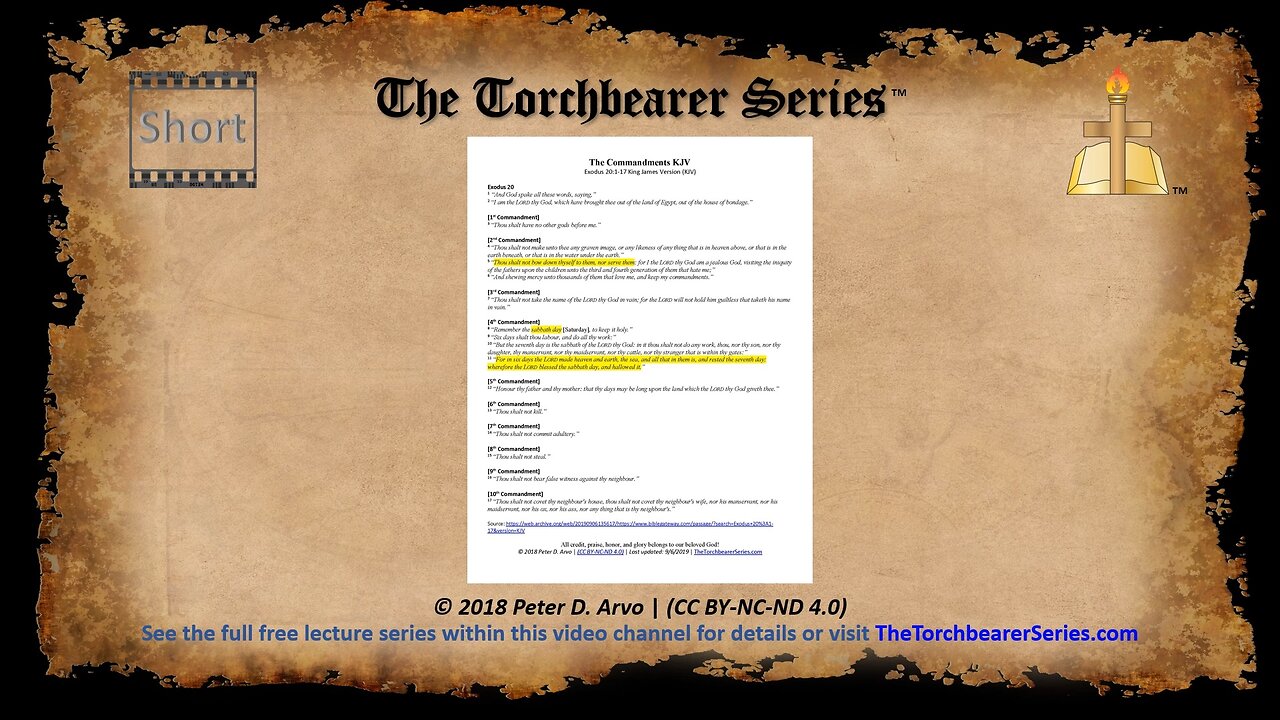Premium Only Content

Short PB - Ten Commandments KJV
A list of the Ten Commandments from the King James Bible.
The First Commandment. “Thou shalt have no other gods before me.” In other words, have no other god before God, and always put God first.
The Second Commandment. “Thou shalt not make unto thee any graven image, or any likeness of any thing that is in heaven above, or that is in the earth beneath, or that is in the water under the earth.”“Thou shalt not bow down thyself to them, nor serve them: for I the LORD thy God am a jealous God, visiting the iniquity of the fathers upon the children unto the third and fourth generation of them that hate me. . .” In other words, do not make, serve, or worship idols/images. Some Christians wonder if the second commandment is irrelevant in modern society, yet many who are Roman Catholic venerate images to this day, and some New Age Christians rely on images of crosses or angels to offer them protection. There are some who ask whether did the Roman Catholics change the second commandment to suit their agenda, we do our best to answer this question in The Torchbearer Series.
The Third Commandment. "Thou shalt not take the name of the LORD thy God in vain; for the LORD will not hold him guiltless that taketh his name in vain.” In other words, this commandment isn't merely referring to not speaking God's name irreverently, but it is also referring to not misrepresenting God and not using His name falsely in your words and actions. This seems to be evidenced by Proverbs 30:9.
The Forth Commandment. “Remember the sabbath day[Saturday], to keep it holy.” “Six days shalt thou labour, and do all thy work:” “But the seventh day is the sabbath of the LORD thy God: in it thou shalt not do any work, thou, nor thy son, nor thy daughter, thy manservant, nor thy maidservant, nor thy cattle, nor thy stranger that is within thy gates:” “For in six days the LORD made heaven and earth, the sea, and all that in them is, and rested the seventh day: wherefore the LORD blessed the sabbath day, and hallowed it.” In other words, observe the Sabbath by resting from your labors on the day and hallowing it. The forth commandment is often considered the most controversial commandment of the ten commandments, which raises questions such as "Was the Sabbath done away with?" and "Was the Sabbath day changed?". We try to go into a great amount of detail concerning the forth commandment in The Torchbearer Series.
The Fifth Commandment. “Honour thy father and thy mother: that thy days may be long upon the land which the LORD thy God giveth thee.” In other words, do not disrespect or dishonor your parents. This verse is sadly often overlooked by Christians, even though the fifth commandment is important when considering the godly harmony of the household.
The Sixth Commandment. "Thou shalt not kill.” In other words, do not commit premeditated murder, and avoid the act of killing whenever possible. We see in David's case of murdering Uriah that this also includes indirectly orchestrating murder as well. Allowing and carrying out abortion also violates the fifth commandment. Exodus 21:22-23 directly refers to bringing "mischief" to (bringing harm to) an unborn child.
The Seventh Commandment. “Thou shalt not commit adultery.” In other words, the meaning is quite straightforward, which is do not carry out the act of adultery. This verse is just as relevant to the single as it is to the married. Jesus warns of merely thinking about committing adultery in Matthew 5:28.
The Eighth Commandment. “Thou shalt not steal.” In other words, do not take anything that does not belong to you for yourself or for someone else. Hardship should never be an excuse for stealing, since God said He would provide for our needs (Matthew 6:31-32).
The Ninth Commandment. “Thou shalt not bear false witness against thy neighbour.” In other words, do not lie, which includes not spreading unconfirmed rumors as being true. A Page Briefing may be made in the future to address the so called moral gray areas concerning the ninth commandment.
The Tenth Commandment. “Thou shalt not covet thy neighbour's house, thou shalt not covet thy neighbour's wife, nor his manservant, nor his maidservant, nor his ox, nor his ass, nor any thing that is thy neighbour's.” In other words, do not obsess and be bitter over what you don't have. This verse may sound harmless, but the thoughts of coveting can and will affect your actions, even if you don't realize it, and will often lead to sin. Note that there are verses that use the word covet positively (ex. 1 Corinthians 12:31), but this only because the word by itself merely means to want something earnestly.
Hopefully this has helped you in understanding the 10 commandments.
See http://www.TheTorchbearerSeries.com for full details and more information on a large variety of topics. Or see the second lecture video containing this content and more: https://www.youtube.com/watch?v=2_uM3cLDifk&list=PL0qwkdBdTcQ9r4QG2XyrqCSDo9l9b0t3Z&index=3
-
 2:10:37
2:10:37
Tundra Tactical
7 hours ago $20.12 earned🔫 World's Okayest Firearm Live Stream: GunCon Drama, NFA Smackdown & Silly 2A Games! 💥
58.7K1 -
 5:13:54
5:13:54
Cripiechuccles
8 hours ago😁💚💙SHATTERDAY WITH CRIPIE💚💙RUMLUV ACTIVATE👌COME IN AND SAY HI!!:😁
17.6K1 -
 2:41:03
2:41:03
DLDAfterDark
6 hours ago $6.43 earnedLet's Talk Suppressors! Feat. Mike From CMMG! The After Hours Armory!
29.3K -
 9:37:22
9:37:22
Reolock
10 hours agoWoW Classic Hardcore | Level and CHAT | RTMP
17.2K1 -
 8:00
8:00
MattMorseTV
11 hours ago $16.27 earnedHe just lost EVERYTHING.
45.9K42 -
 4:42:20
4:42:20
FusedAegisTV
11 hours ago$1000 Fortnite Tournament | 19 TEAMS!! #RumbleGaming
50.1K2 -
 3:05:57
3:05:57
Shawn Cav Live
6 hours agowarzone and splitgate | SCL 07.05.25
32.2K -
 1:50:28
1:50:28
Omar Elattar
3 days agoI Asked a $40M Ex-Cop How He Built His Business After DUI & Rehab!
43.1K1 -
 1:10:41
1:10:41
Dad Dojo Podcast
2 days ago $2.00 earnedEP38: SCAMMED
33.4K1 -
 3:09:47
3:09:47
Mally_Mouse
11 hours agoSpicy Saturday!! - Let's Play: Power Wash Simulator
34.3K3